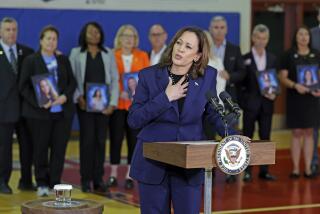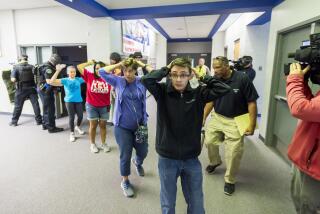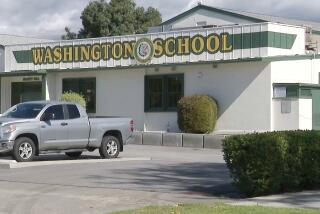Victim and hero: Florida football coach ushered his students to safety before the gunman came for him
When the gunfire started, so did the crackle of the school network of walkie-talkies.
Willis May, the head football coach, was hunkered in his office with some players and college recruiters when he heard a familiar voice: that of his trusted assistant coach Aaron Feis.
“No, that is not firecrackers,” Feis said.
It was the last time May would hear that voice.
Feis was scrambling to usher students to safety, at one point shielding several girls from gunfire, according to witness accounts.
“I saw him running toward the gunshots,” said Colton Haab, a junior.
It cost Feis his life — he was one of 17 people killed Wednesday at Marjory Stoneman Douglas High School when a former student entered the campus, pulled a fire alarm and began shooting an AR-15 rifle as students started to evacuate.
The details of how students, teachers and staff members at the Parkland, Fla., school responded to the shooting were still emerging Thursday. But in the immediate hours after the killings, Feis quickly fulfilled the role of hero for a community badly in need of one.

Students relive the school shooting in Florida and discuss the loss of their coach.
Feis was a familiar sight to many of the 3,000 or so students at the school, where he also worked as a security guard, patrolling the open-air hallways in a golf cart.
He was a true Eagle — the school mascot — having attended Douglas, playing center on the football team. He graduated in 1999 and returned as a coach three years later, eventually settling in nearby Coral Springs with his wife, Melissa Feis, and their 8-year-old daughter, Ariel, who would sometimes accompany him to practice and run onto the field.
“He was the nice coach — the one who never yelled at us,” said 17-year-old Yohance Williams, a senior who plays linebacker. “He was more of a friend than a coach to us. We all loved coach Feis.”
An imposing figure, he could be strict, forcing students attempting to skip school back to their classrooms. But he was also sympathetic.
“He’d smile and just talk to you about your day,” said senior Taylor Thompson, 17, a student trainer with the football team.
Haab, 17, had chatted with Feis in the hall Wednesday morning at 10:45, just after second period.
“I had a conversation with him, just saying, ‘Hi, how are you, coach?’ — going back and forth, talking about work outside of school, how’s football going,” Haab said. “Because I used to play football, so just checking up on the program.”
When a fire alarm went off around 2:20 p.m., Haab assumed that it was either the school conducting another drill — there had been one that morning — or that somebody had burned something in cooking class and set it off.
“Nothing major,” he said, recalling his initial reaction.
He gathered his papers from class, ventured into the hallway and started to close the classroom door behind him.
Then he heard the gunshots.
And for the second time that day, he saw Feis. There was no conversation this time. The coach was headed into the danger.
Haab started making phone calls. His younger brother, a 16-year-old sophomore, told him he was safe elsewhere in the school. His father promised to send updates. And a family friend and retired Coral Spring police officer instructed him on how to barricade the classroom.
“We prayed for the best; in case he were to come in the classroom, we were ready to stop him,” Haab said.
The shooter never tried to enter.
Back in the office of the head football coach, he and his visitors were also on lockdown. Later they spotted the alleged killer, 19-year-old Nikolas Cruz, pass by the office window among the rush of students who were evacuating.
He was caught by police a few miles from the school about an hour and 20 minutes after the shooting began.
As the survivors of the massacre came out of hiding, word spread of how Feis had tried to save students, and the mourning for him began.
“He was a hero,” Haab said as he stood by police cars and tape blocking the entrance to the school, which was closed Thursday. “He was always putting everyone else before himself. He was selfless, always making sure everyone was OK.”
A tweet from the football team said: “He selflessly shielded students from the shooter when he was shot. He died a hero and he will forever be in our hearts and memories.”
May described Feis as a loyal “big ol’ teddy bear” who could also be “hardcore.”
“He coached hard. Real good line,” May said. “He did a great job with the [offensive] line. He took pride with working with those guys.”
“I trusted him,” May added. “He had my back. He worked hard. Just a good man. Loved his family. Loved his brother — just an excellent family man.”
Williams and other football players wore their maroon Douglas football jerseys to a memorial for the victims Thursday at Parkridge Church. They huddled together at the front of the crowd, eyes teary.
Parents said they couldn’t imagine the school without Feis.
“He was a fixture there,” said Traci Meyers, 43, as she arrived at the memorial with her 14-year-old daughter Raquel, who had hid in a closet during the shooting and saw dead bodies when she finally fled.
Broward County Sheriff Scott Israel recounted Feis’ bravery at a Thursday news briefing, saying he was killed “tragically, inhumanely.”
“He did it protecting others,” Israel said. “That’s who Aaron Feis was.”
The sheriff said he knew Feis well. The two men had coached together, and the sheriff’s two sons had played for Feis.
“I don’t know when Aaron’s funeral is. I don’t know how many adults are going to go, but you’ll get 2,000 kids there,” the sheriff said. “The kids in this community loved him — they adored him. He was one of the greatest people I knew, a phenomenal man.”
The South Florida Sun Sentinel contributed to this report.
molly.hennessy-fiske@latimes.com
@mollyhf
More to Read
Start your day right
Sign up for Essential California for news, features and recommendations from the L.A. Times and beyond in your inbox six days a week.
You may occasionally receive promotional content from the Los Angeles Times.







